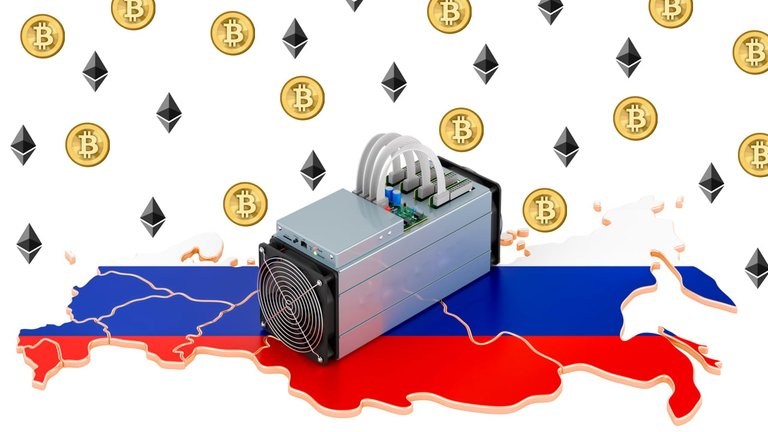Russia and bitcoin mining... A story of love and hate!

Russia is shifting its approach towards cryptocurrency and positioning itself to become a key player in Bitcoin mining. A major initiative in this strategy is centered on the Buryatia region, where a significant energy infrastructure upgrade is planned. The region’s Bitcoin mining hub will benefit from the renovation of a thermal power plant expected to be operational "before the end of 2029." According to the state news agency TASS, the revamped plant will not only produce heat but also generate electricity, creating an energy reserve for both Bitcoin mining and local needs, including Ulan-Ude, the region's capital.
Growing Energy Demands Due to Bitcoin Mining
The surge in cryptocurrency mining has placed increasing demands on the local energy grid. Russian President Vladimir Putin recently acknowledged the significant growth in mining activity in Buryatia and other regions, noting the strain it places on power infrastructure. Currently, Buryatia’s energy supply is managed by the Gusinoozerskaya TTP, a Soviet-era thermal power plant completed in the late 1970s. However, the plant suffered damages in June 2022 due to a transformer failure and fire, which led to power outages lasting several days.

To address this, Yevgeny Lukovnikov, Vice President of the local government, has announced plans to add two additional power units to the Gusinoozerskaya plant, which will enhance the region's energy reserve. The government is optimistic that this expansion will not only meet the growing local demand but also provide up to 300 MW of power to neighboring Mongolia. Over $418 million is being invested in the plant's modernization, reflecting the strategic importance of this upgrade in supporting both domestic and international energy needs.
Historical Context and Delayed Energy Projects
The TPP-2 power station, a project initiated during the Soviet era, has long been incomplete. Originally designed in the late 1970s, the plant saw some progress, including the installation of a steam boiler in 1991, which still supplies 30% of Ulan-Ude's heating capacity. However, the full completion of the project was never realized, leaving gaps in the region’s energy infrastructure.
Challenges from Cryptocurrency Miners
Cryptocurrency mining has been partially blamed for exacerbating energy shortages in Buryatia. TASS reports that miners, particularly in nearby Irkutsk, have contributed to energy deficits, straining the reliability of the power supply in Buryatia. The Russian Ministry of Energy has highlighted “several issues” related to power deficits in Irkutsk, the traditional Bitcoin mining hub, and indicated that mining has also created supply problems in southern Buryatia and parts of the Zabaikalsky Krai region. President Putin emphasized the broader societal impact of mining, stating that it has severe consequences for businesses, residential areas, and public utilities.

Despite Buryatia’s reputation as a Bitcoin mining hotspot, Lukovnikov stressed that most mining activities in the region are illegal. He clarified that only two authorized cryptocurrency mining companies operate in Buryatia, both of which are closely monitored for energy consumption. Lukovnikov also stated that the region has made significant progress in curbing illegal mining activities, adding that if crypto mining leads to excessive energy use and disrupts the local population, it should be restricted, and miners disconnected from the grid if necessary.
Russia’s Mixed Approach to Mining Regulation
While Lukovnikov’s comments reflect a tough stance on unauthorized Bitcoin mining, Buryatia and other regions like Irkutsk have shown a more flexible approach. Irkutsk, for example, has both cracked down on illegal miners and actively sought to attract legal operations to the region. This dual strategy highlights the complexities of Russia's evolving policy on crypto mining.
At the federal level, Moscow appears more stringent and is preparing to impose taxes on industrial-scale cryptocurrency mining. Some experts believe this policy could help Russia build reserves in Bitcoin, which could then be used in international trade agreements with foreign companies. As a result, several regions previously considered less viable for Bitcoin mining have announced plans to develop cutting-edge data centers, aiming to attract more mining activities under stricter regulations.
Russia’s Role in Global Bitcoin Mining

Russian cryptocurrency experts estimate that over 90% of the country’s miners focus exclusively on Bitcoin. With this growing emphasis on cryptocurrency, and significant investments in energy infrastructure, Russia seems poised to enhance its position as a major player in the global Bitcoin mining landscape. By leveraging both domestic resources and international opportunities, the country is seeking to capitalize on the expanding role of cryptocurrencies in the global economy while navigating the challenges posed by rising energy demands.